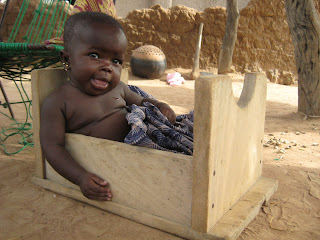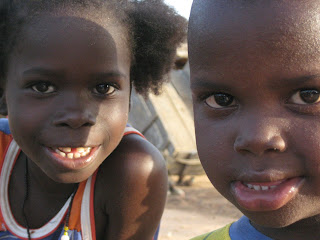
Making peanut butter to use in our sauce

All the kids from my compound in their new Christmas clothes

Look at that sweet baby :)

Batuma, Christine and I outside her house before we went to church























It was my first Saturday night in Zana and I heard the tinkling of keys and a tap tap on my corrugated iron window shutters which means Esayi, my homologue, was coming to give me a visit. He announces when he's coming by making these noises because I'm so jumpy and I really appreciate it because it means I don't scream every time he comes to see me which is daily. I was in my kitchen cooking dinner, my hair still dripping from my nightly bucket bath under the stars. Esayi said folks were meeting at the church to sing and if I'd like to come, was welcome to join. I finished making dinner and eating it and made my way over to the church which is an unassuming mud structure no larger than my house, which is just the right size for me, but makes for a very compact worship space. I sat in the back on a cement bench and watched the evening unfold before me. Esayi stood at the front of the church with another boy, Emmanuel, and they led the singing. There were maybe 10 people there, but as the singing progressed, more people came out of the woodwork and joined me on my cement bench and others. I felt cozy and at home sitting there, listening to music I couldn't understand but could feel the emotion in the people's voices. A single kerosene lamp was all we had to light the room and it made the two men up front's shadows loom large before me and made everyone around me glow.
Top Ten Zana:
1 Cute little pigs run around everywhere
2 No cars - it's safe and eco-friendly out here!
3 Stunning sunrises and sets
4 While it's hard on the back, it is very soothing to sleep outside under the stars and with a breeze
5 Zana is filled with patient people who like to laugh
6There's an interest in ultimate frisbee! Little by little (Donni donni in bambara) we'll get a team going so we can play a game
7 Folks will listen to me play "Lyin' Eyes" ad nauseum (just like my college roomates :)
8 I don't have to worry about cutting the grass (or neighbors eyeing my overgrown lawn with weary eyes) because people just come into my yard and hammer stakes - with their livestock attached - into the ground. It's like my own petting zoo - goats, horses, donkeys, chickens. You name it, it's likely in my front yard.
9 There's a harmonious mix Christianity, Islam and animism which means I get to celebrate 3 times the holidays!
10 There's an endless supply of babies to play with and coo over.
Two of the other newly installed San volunteers were out shopping for house things at the market and as they walked, a child wouldn't stop pestering them. The kid kept waving an old book in their faces - and they kept shooing him away and, with their fragmented Bambara, trying to explain they weren't interested. The kid followed them throughout the market until he gave up and handed the planner to an older man who then approached the two volunteers. Now, with the children here, it's expected that they'll accost "toubabs" or foreigners, but older people generally tend to keep to themselves. The older man didn't bother with words - he just put the book in the volunteer's basket and left. The two volunteers were so confused - so they opened the book, which they now recognized as a planner, and flipped through the pages and found, written in small print and in pencil, the name of a volunteer who has ben here for two years and is extending for a third. The little boy had just wanted to return the lost book and knew our community is so small here, he knew toubabs would return this book to whomever it belonged.
This is just one example of why I know I've found another place to call home here in San/Zana.
 Kamaje, my beautiful host grandmother that would clap as I danced and rub my belly when I said I'd eaten dinner and was full.
Kamaje, my beautiful host grandmother that would clap as I danced and rub my belly when I said I'd eaten dinner and was full.  This is my out door bathroom, called a negen (with funky e's). Inside there's a covered hole that you use as the toilet. I'll bathe here as well and it's beautiful when the sun is setting because there's a perfect view of it from these mud walls.
This is my out door bathroom, called a negen (with funky e's). Inside there's a covered hole that you use as the toilet. I'll bathe here as well and it's beautiful when the sun is setting because there's a perfect view of it from these mud walls.  Here is one such sunset in Zana.
Here is one such sunset in Zana.  This is my bed at site, with the current volunteer's things but you get the idea :)
This is my bed at site, with the current volunteer's things but you get the idea :) Here's my cooking area, I'll try and duplicate this because it seemed to work pretty well.
Here's my cooking area, I'll try and duplicate this because it seemed to work pretty well. My front room with the tent I slept in set up. You too could sleep in a tent in my home! Or we could sleep under the stars and on the roof.
My front room with the tent I slept in set up. You too could sleep in a tent in my home! Or we could sleep under the stars and on the roof. This Baobab is right outside my compound. The birds that live in it are really large, as you can tell by the size of their nests.
This Baobab is right outside my compound. The birds that live in it are really large, as you can tell by the size of their nests. The smiles and laughs of children! The one on the right is Umu who, although a bit of a pain in the butt at times, was my favorite at homestay. Whenever music would play, her hips would get a little twitch and she'd just start dancing.
The smiles and laughs of children! The one on the right is Umu who, although a bit of a pain in the butt at times, was my favorite at homestay. Whenever music would play, her hips would get a little twitch and she'd just start dancing.  This is one of my other sisters, Jatu, who often came over to see what I was up to and silently observe.
This is one of my other sisters, Jatu, who often came over to see what I was up to and silently observe.  Usuman! This baby always had a smile on his face and was my favorite baby because of that cute smile and sweet belly.
Usuman! This baby always had a smile on his face and was my favorite baby because of that cute smile and sweet belly. This is Christine, the baby at my site who is 2 months old. Isn't she precious!
This is Christine, the baby at my site who is 2 months old. Isn't she precious! My new house! The structure in front and to the right is a kitchen, but I'll do my cooking inside and use that place as storage (?).
My new house! The structure in front and to the right is a kitchen, but I'll do my cooking inside and use that place as storage (?).  This is the view of my host family's kitchen and home (left to right) at sunset.
This is the view of my host family's kitchen and home (left to right) at sunset.  Talking about the fishbowl feeling in the last entry, this was the normal amount of people who would sit around me and watch me, silently, for the first few nights. Now that I can actually say something back to them, I'm less - though not by much, of an anomaly.
Talking about the fishbowl feeling in the last entry, this was the normal amount of people who would sit around me and watch me, silently, for the first few nights. Now that I can actually say something back to them, I'm less - though not by much, of an anomaly.  Me and Joelle, a kindred spirit, and another agriculture volunteer with our "dabas" in the test garden in Kabe. We're learning about agriculture through half-day sessions with current volunteers and Malian trainers in my homestay village through hands-on demonstrations. I wear my hat everyday but as you can see by Joelle's outfit, am not required to be in dresses or skirts all the time by any means.
Me and Joelle, a kindred spirit, and another agriculture volunteer with our "dabas" in the test garden in Kabe. We're learning about agriculture through half-day sessions with current volunteers and Malian trainers in my homestay village through hands-on demonstrations. I wear my hat everyday but as you can see by Joelle's outfit, am not required to be in dresses or skirts all the time by any means.  This is the view from my hut in Kabe. The bench in the middle is where my host dad hangs out at night. The structure to the right is one of his wive's huts. Malian men are required to be provide separate homes for their wives and then they have their own place too.
This is the view from my hut in Kabe. The bench in the middle is where my host dad hangs out at night. The structure to the right is one of his wive's huts. Malian men are required to be provide separate homes for their wives and then they have their own place too.  Here is Gibril (at right) and his brother Adama getting ready to head to Bamako to play music. Transportation is funny around here, no one follows traffic laws and motos are always weaving in and out. Gibril charges my cell phone on this motorcycle battery.
Here is Gibril (at right) and his brother Adama getting ready to head to Bamako to play music. Transportation is funny around here, no one follows traffic laws and motos are always weaving in and out. Gibril charges my cell phone on this motorcycle battery. 
